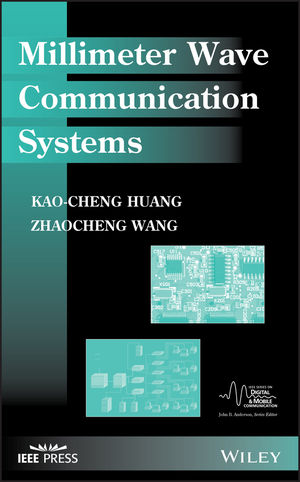Millimeter Wave Communication SystemsISBN: 978-0-470-40462-1
Hardcover
304 pages
April 2011, Wiley-IEEE Press
 This is a Print-on-Demand title. It will be printed specifically to fill your order. Please allow an additional 10-15 days delivery time. The book is not returnable.
|
||||||
Preface ix
List of Abbreviations xi
1 Millimeter Wave Characteristics 1
1.1 Millimeter Wave Characteristics 2
1.2 Channel Performance at 60 GHz 5
1.3 Gigabit Wireless Communications 11
1.4 Development of Millimeter Wave Standards 16
1.5 Coexistence with Wireless Backhaul 24
References 29
2 Review of Modulations for Millimeter Wave Communications 33
2.1 On/Off Keying (OOK) 34
2.2 Phase Shift Keying (PSK) 39
2.3 Frequency Shift Keying (FSK) 52
2.4 Quadrature Amplitude Modulation (QAM) 58
2.5 Orthogonal Frequency Division Multiplexing (OFDM) 63
References 68
3 Millimeter Wave Transceivers 71
3.1 Millimeter Wave Link Budget 71
3.2 Transceiver Architecture 74
3.3 Transceiver Without Mixer 80
3.4 Receiver Without Local Oscillator 86
3.5 Millimeter Wave Calibration 93
3.6 Research Trend: Transceiver Siliconization 96
References 96
4 Millimeter Wave Antennas 99
4.1 Path Loss and Antenna Directivity 100
4.2 Antenna Beamwidth 106
4.3 Maximum Possible Gain-to-Q 108
4.4 Polarization 112
4.5 Beam Steering Antenna 120
4.6 Millimeter Wave Design Consideration 124
4.7 Production and Manufacture 127
References 129
5 Millimeter Wave Mimo 133
5.1 Spatial Diversity of Antenna Arrays 134
5.2 Multiple Antennas 138
5.3 Multiple Transceivers 144
5.4 Noise Coupling in a MIMO System 154
References 159
6 Advanced Diversity Over Mimo Channels 163
6.1 Potential Benefits for Millimeter Wave Systems 164
6.2 Spatial and Temporal Diversity 165
6.3 Spatial and Frequency Diversity 171
6.4 Dynamic Spatial, Frequency, and Modulation Allocation 177
References 184
7 Advanced Beam Steering and Beam Forming 187
7.1 The Need for Beam-Steering/Beam-Forming 188
7.2 Adaptive Frame Structure 191
7.3 Advanced Beam Steering Technology 194
7.4 Advanced Antenna ID Technology 202
7.5 Advanced Beam Forming Technology 205
References 214
8 Single-Carrier Frequency Domain Equalization 217
8.1 Advantages of SC-FDE over OFDM for Millimeter Wave Systems 218
8.2 Preamble Design 222
8.3 Adaptive Channel Estimation 226
8.4 Frequency Domain Equalization 231
8.5 Decision Feedback Equalization 235
References 258
Appendix: Simulation Tools 261
Index 263



